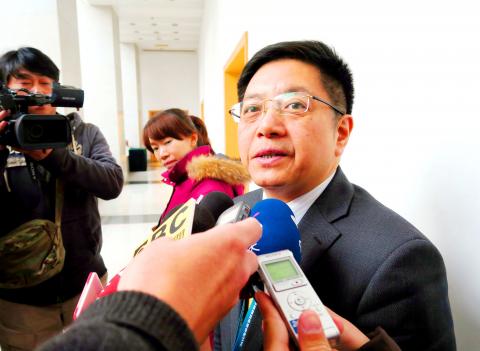The central government yesterday expressed its deep regret and discontent with the International Criminal Police Organization’s (Interpol) rejection of its bid to attend the organization’s upcoming general assembly.
Asked if Beijing was behind Interpol’s decision, Minister of Foreign Affairs David Lee (李大維) said “that is a very obvious factor.”
Presidential Office spokesman Alex Huang (黃重諺) last night urged China to acknowledge the Republic of China’s existence and stop hurting the well-being of Taiwanese by obstructing Taiwan’s participation in international organizations.

Photo: CNA
The government will continue to work closely with the US and other like-minded nations to promote Taiwan’s participation in Interpol, in the hope that Taiwan can be included in the global network for public security protection, the Ministry of Foreign Affairs said.
Taiwan was forced to withdraw from Interpol in 1984 when China joined the organization.
For the first time in 32 years, the government last month applied to participate as an observer at Interpol’s 85th general assembly, which runs from tomorrow to Friday in Bali, Indonesia.
Interpol president Mireille Ballestrazzi and secretary-general Jurgen Stock separately wrote to Criminal Investigation Bureau Commissioner Liu Po-liang (劉柏良) stating the organization’s decision to turn down Taiwan’s application, the ministry said.
The ministry said that Taiwan’s bid to participate in the assembly does not involve politics, but is intended to facilitate cooperation with the police forces of other nations and contribute to global efforts against organized crime, cybercrime, cross-border crime and terrorism.
With cross-border crime becoming a serious problem amid globalization, having no access to Interpol information is posing a challenge to Taiwan’s crime-fighting operations, the ministry said, urging Interpol to deal with Taiwan’s case positively and pragmatically based on the need to maintain global security.
Considering the need to maintain security during next year’s Universiade in Taipei, the ministry has also requested that Interpol allow Taiwan to access its I-24/7 global police communications system and the Stolen and Lost Travel Documents database.
Meanwhile, the ministry said it appreciated the US’ support for Taiwan’s participation in the assembly.
Both the US Senate and House of Representatives in March passed legislation requiring the US secretary of state to develop a strategy to obtain observer status for Taiwan in Interpol. The bill was then signed into law by US President Barack Obama.
Separately yesterday, the Mainland Affairs Council urged China to stop obstructing Taiwan’s efforts to particiate in international organizations.
Taiwan and China should treat each other in a friendly way and seek to resolve differences of opinion through bilateral dialogue in the interests and well-being of their people, the council said.
A survey conducted by the council last month revealed that 80 percent of Taiwanese believe Taiwan’s bids to take part in international organizations should not be subject to political interference, the council said, urging Beijing and the international community not to ignore public opinion in Taiwan.
Additional reporting by Su Fang-ho

MORE VISITORS: The Tourism Administration said that it is seeing positive prospects in its efforts to expand the tourism market in North America and Europe Taiwan has been ranked as the cheapest place in the world to travel to this year, based on a list recommended by NerdWallet. The San Francisco-based personal finance company said that Taiwan topped the list of 16 nations it chose for budget travelers because US tourists do not need visas and travelers can easily have a good meal for less than US$10. A bus ride in Taipei costs just under US$0.50, while subway rides start at US$0.60, the firm said, adding that public transportation in Taiwan is easy to navigate. The firm also called Taiwan a “food lover’s paradise,” citing inexpensive breakfast stalls

TRADE: A mandatory declaration of origin for manufactured goods bound for the US is to take effect on May 7 to block China from exploiting Taiwan’s trade channels All products manufactured in Taiwan and exported to the US must include a signed declaration of origin starting on May 7, the Bureau of Foreign Trade announced yesterday. US President Donald Trump on April 2 imposed a 32 percent tariff on imports from Taiwan, but one week later announced a 90-day pause on its implementation. However, a universal 10 percent tariff was immediately applied to most imports from around the world. On April 12, the Trump administration further exempted computers, smartphones and semiconductors from the new tariffs. In response, President William Lai’s (賴清德) administration has introduced a series of countermeasures to support affected

CROSS-STRAIT: The vast majority of Taiwanese support maintaining the ‘status quo,’ while concern is rising about Beijing’s influence operations More than eight out of 10 Taiwanese reject Beijing’s “one country, two systems” framework for cross-strait relations, according to a survey released by the Mainland Affairs Council (MAC) on Thursday. The MAC’s latest quarterly survey found that 84.4 percent of respondents opposed Beijing’s “one country, two systems” formula for handling cross-strait relations — a figure consistent with past polling. Over the past three years, opposition to the framework has remained high, ranging from a low of 83.6 percent in April 2023 to a peak of 89.6 percent in April last year. In the most recent poll, 82.5 percent also rejected China’s

PLUGGING HOLES: The amendments would bring the legislation in line with systems found in other countries such as Japan and the US, Legislator Chen Kuan-ting said Democratic Progressive Party (DPP) Legislator Chen Kuan-ting (陳冠廷) has proposed amending national security legislation amid a spate of espionage cases. Potential gaps in security vetting procedures for personnel with access to sensitive information prompted him to propose the amendments, which would introduce changes to Article 14 of the Classified National Security Information Protection Act (國家機密保護法), Chen said yesterday. The proposal, which aims to enhance interagency vetting procedures and reduce the risk of classified information leaks, would establish a comprehensive security clearance system in Taiwan, he said. The amendment would require character and loyalty checks for civil servants and intelligence personnel prior to